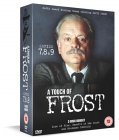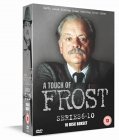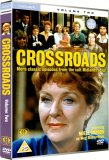![Cathy Come Home [DVD]](/pictures/1109735.jpg) Cathy Come Home | DVD | (05/09/2011)
from £7.49
| Saving you £-1.49 (N/A%)
| RRP
Cathy Come Home | DVD | (05/09/2011)
from £7.49
| Saving you £-1.49 (N/A%)
| RRP Controversial moving and brilliantly acted this film directed by Ken Loach is arguably the most influential television drama ever broadcast. Watched by 12 million people - a quarter of the British population at the time - on its first broadcast on 16 November 1966 Cathy Come Home was a defining moment in British television history. It provoked major public and political discussion and challenged the accepted conventions of television drama. The film tells the story of Cathy and Reg a couple with three young children who find their life spiralling into poverty when Reg loses his well-paid job. Gripping and emotional it remains a truly ground-breaking piece of dramatic fiction engaging viewers with social issues such as homelessness unemployment and the rights of mothers to keep their own children. Utilising documentary-style filming on location the film consolidated director Ken Loach's reputation for hard-hitting social realism.
![Ken Loach at the BBC [DVD]](/pictures/1109736.jpg) Ken Loach at the BBC | DVD | (05/09/2011)
from £24.09
| Saving you £-5.09 (N/A%)
| RRP
Ken Loach at the BBC | DVD | (05/09/2011)
from £24.09
| Saving you £-5.09 (N/A%)
| RRP 1965 saw Ken Loach working as one of the in house directors of the groundbreaking The Wednesday Play series at The BBC which included Three Clear Sundays Up the Junction and The End of Arthur's Marriage. Of these plays Up The Junction had the most impact telling the story of three young women factory workers in their work and home lives focusing on Rube as she meets her first boyfriend and chronicles the significant life changing events that follow including an illegal abortion. Not only controversial at the time Loach's inter-cutting of real life interviews mixed in with drama became a signpost for his future directing style striving for naturalism and realism. 1966 saw Ken Loach's breakthrough piece Cathy Come Home. The play follows the lives of young sweethearts Cathy (Carol White fresh from Up The Junction) and Reg (Ray Brooks) starting out as a newly married couple moving into a new place and having children. Reg then suffers an accident which means he is unable to work and they end up being evicted and separated. With Cathy homeless but still looking after the children she faces having her children taken away from her by Social Services. This is perhaps the play that has had more impact than any other on television highlighting the very real problem of homelessness. Even some forty years later the power of Cathy Come Home remains undiminished. In Two Minds charts the turbulent life of a young woman who endures a difficult family life and after throwing a kitchen knife at her mother is diagnosed as a schizophrenic. Much like Cathy Come Home the realistic documentary style helps provide veracity to the story. Written by Jim Allen The Big Flame is a story of striking Liverpool dock workers who decide that to safeguard their futures they must control the port themselves. This was the first of several Ken Loach / Jim Allen collaborations - many of which would be starkly political. The BAFTA nominated Days of Hope was Jim Allen's tale of a working-class family in the period from 1916 to 1926 taking in the First World War events in Ireland and the General Strike of 1926. Running to well over six hours the series tells an epic story particularly in the light of the parlous state of the economy and labour relations in Britain at the time. A radical series in every sense Jim Allen was able create real parallels in Days of Hope that resonated with the working class of the mid 1970's and the political climate at that time. Loach returned to the BBC with The Price of Coal (written by Kes author Barry Hines) a film which depicted the lives of those living in a coalfield community. The first part subtitled Meet The People is a comic tale surrounding the story of a colliery community in preparation for a visit by Prince Charles and the efforts being put on by the management to make the pit fit for a future king involving grassing over an unsightly coal slag heap and whitewashing everything in site. The second part Back To Reality is completely different in tone when the colliery suffers a sudden underground explosion trapping killing and injuring the miners and as the rescue team work frantically to rescue those trapped those above ground argue about who is to blame. The Rank and File which completes the collection again written by Jim Allen is a story based around the strike by the Pilkington Glass workers. This beautifully packaged collection displays some of Loach's very best work and gives a real insight into working class life in the 60's and 70's. The collection also features an interview with Ken Loach a documentary entitled Housing Problems and a commentary track for Cathy Come Home.
 A Touch of Frost: Series 7, 8 and 9 | DVD | (04/10/2004)
from £20.95
| Saving you £4.04 (19.28%)
| RRP
A Touch of Frost: Series 7, 8 and 9 | DVD | (04/10/2004)
from £20.95
| Saving you £4.04 (19.28%)
| RRP Further investigations with garrulous detective Frost (David Jason)... Includes: Line Of Fire Benefit Of The Doubt and Mistaken Identity.
![Dulcima [DVD]](/pictures/1127540.jpg) Dulcima | DVD | (17/04/2019)
from £12.98
| Saving you £-1.00 (N/A%)
| RRP
Dulcima | DVD | (17/04/2019)
from £12.98
| Saving you £-1.00 (N/A%)
| RRP This acclaimed drama feature casts Cathy Come Home star Carol White as a young woman whose determined efforts to escape a life of rural poverty lead to complications and worse; Oscar winner John Mills is the lonely ageing farmer with whom she finds work accommodation and the promise of easy money. An earthy sympathetic adaptation of H.E. Bates' novel Dulcima earned director Frank Nesbitt a Golden Bear at the Berlin Film Festival in 1971. This rare much sought-after film is now presented in a brand-new transfer from the original elements. Dulcima a pretty girl treated as a drudge by her family lifts herself from her environment by becoming housekeeper to Parker a curmudgeonly widower living in drunken disarray on a neighbouring farm. When she sees the amount of money he has stashed around the place Dulcima is happy enough to indulge his growing desire for her and a strange yet mutually beneficial relationship develops. But a handsome young gamekeeper newly arrived on a nearby estate also catches Dulcima's eye... SPECIAL FEATURES: [] Original Theatrical Trailers [] Image Gallery [] Original Pressbook PDF
![Children's Film Foundation Bumper Box 5 [3 x DVD set]](/pictures/1165067.jpg) Children's Film Foundation Bumper Box 5 | DVD | (22/04/2024)
from £24.74
| Saving you £N/A (N/A%)
| RRP
Children's Film Foundation Bumper Box 5 | DVD | (22/04/2024)
from £24.74
| Saving you £N/A (N/A%)
| RRP ![Made [DVD]](/pictures/1140646.jpg) Made | DVD | (22/08/2016)
from £12.98
| Saving you £-1.00 (N/A%)
| RRP
Made | DVD | (22/08/2016)
from £12.98
| Saving you £-1.00 (N/A%)
| RRP This compelling emotional drama stars Carol White as a young single mother who finds herself caught between two people a local priest and a folk singer each of whom wants to convert her to his own worldview. An elegy to a younger generation looking for something to believe in, Made co-stars hugely influential folk-rock musician Roy Harper in his screen debut. Produced by Joseph Janni who previously made the astonishingly successful Poor Cow with White directed by The Long Good Friday's John Mackenzie and featuring new songs specially composed by Harper, this much sought-after film is featured here in a brand-new restoration from the original film elements, in its as-exhibited theatrical aspect ratio. SPECIAL FEATURES: Original Theatrical Trailer Booklet by Professor Neil Sinyard Image Gallery Original Pressbook PDF
![Poor Cow [DVD] [1967]](/pictures/1140572.jpg) Poor Cow | DVD | (25/07/2016)
from £10.35
| Saving you £7.64 (73.82%)
| RRP
Poor Cow | DVD | (25/07/2016)
from £10.35
| Saving you £7.64 (73.82%)
| RRP "I fell in the family way when I was 18 and I got married to a right bastard". Ken Loach's debut feature tells the story of Joy, a young mother (Carol White) whose chauvinistic thug of a husband is thrown into prison. She takes up with one of his friends, lovable, kind-hearted burglar Terence Stamp, but he too ends up in jail.It's intriguing to compare Poor Cow with Cathy Come Home, which Loach made for TV with the same actress at around the same time. Both are about mums trying to make a go of their lives in adverse circumstances. Cathy Come Home, shot in black and white, is an altogether tougher film. Poor Cow, with its Donovan music, gaudy colour photography, star names, and incongruously bawdy humour, seems lightweight by comparison. Certain sequences--Joy making love in the hay or posing half-naked for lecherous amateur photographers--must surely make Loach grimace now. There are some powerful moments--Joy desperately looking for her son who has wandered off, unattended, onto a building site, or trying to escape from her abusive husband--which anticipate such later Loach films as Ladybird, Ladybird or Raining Stones. The scenes between Joy and Stamp are played with real tenderness and humour. Don't be surprised if you think you've seen them before--some of the footage of Stamp was used in Steven Soderbergh's recent thriller, The Limey. --Geoffrey Macnab
![Poor Cow [Blu-ray] [1967]](/pictures/1140339.jpg) Poor Cow | Blu Ray | (25/07/2016)
from £10.99
| Saving you £12.00 (109.19%)
| RRP
Poor Cow | Blu Ray | (25/07/2016)
from £10.99
| Saving you £12.00 (109.19%)
| RRP "I fell in the family way when I was 18 and I got married to a right bastard". Ken Loach's debut feature tells the story of Joy, a young mother (Carol White) whose chauvinistic thug of a husband is thrown into prison. She takes up with one of his friends, lovable, kind-hearted burglar Terence Stamp, but he too ends up in jail.It's intriguing to compare Poor Cow with Cathy Come Home, which Loach made for TV with the same actress at around the same time. Both are about mums trying to make a go of their lives in adverse circumstances. Cathy Come Home, shot in black and white, is an altogether tougher film. Poor Cow, with its Donovan music, gaudy colour photography, star names, and incongruously bawdy humour, seems lightweight by comparison. Certain sequences--Joy making love in the hay or posing half-naked for lecherous amateur photographers--must surely make Loach grimace now. There are some powerful moments--Joy desperately looking for her son who has wandered off, unattended, onto a building site, or trying to escape from her abusive husband--which anticipate such later Loach films as Ladybird, Ladybird or Raining Stones. The scenes between Joy and Stamp are played with real tenderness and humour. Don't be surprised if you think you've seen them before--some of the footage of Stamp was used in Steven Soderbergh's recent thriller, The Limey. --Geoffrey Macnab
 Bergerac - Series 3 | DVD | (23/10/2006)
from £15.30
| Saving you £12.68 (103.01%)
| RRP
Bergerac - Series 3 | DVD | (23/10/2006)
from £15.30
| Saving you £12.68 (103.01%)
| RRP Jim Bergerac (Nettles) is a recovering alcoholic divorcee and father of a young daughter a Detective Sergeant with the Bureau des Etrangers Jersey. Jim likes doing things his own ways a true maverick and consequently doesn't always carry out his investigations in the traditional manner the way his boss would like... Episodes Comprise: 1. Ninety Per Cent Proof 2. A Hole In The Bucket 3. Holiday Snaps 4. Ice Maiden 5. Come Out Fighting 6. A Touch Of Eastern Promise 7. A Cry In The Night 8. The Company You Keep 9. Tug Of War 10. House Guests
![Prehistoric Women [1967]](/pictures/1053920.jpg) Prehistoric Women | DVD | (23/11/2006)
from £9.99
| Saving you £3.00 (30.03%)
| RRP
Prehistoric Women | DVD | (23/11/2006)
from £9.99
| Saving you £3.00 (30.03%)
| RRP Savage! Primitive! Deadly! A civilization of gorgeous cavewomen abduct men for mating purposes...
![Dulcima [Blu-ray]](/pictures/1152674.jpg) Dulcima | Blu Ray | (24/08/2020)
from £9.68
| Saving you £N/A (N/A%)
| RRP
Dulcima | Blu Ray | (24/08/2020)
from £9.68
| Saving you £N/A (N/A%)
| RRP An acclaimed and memorable drama, Dulcima stars Cathy Come Home's Carol White as a young woman whose determined efforts to escape a life of rural poverty lead to complications and worse. Co-starring Oscar winner John Mills as a lonely, ageing farmer, this earthy, award-winning adaptation of H.E. Bates' classic novel is presented here as a brand-new High Definition transfer from original film elements in its original theatrical aspect ratio. Dulcima, a pretty girl treated as a drudge by her family, becomes a housekeeper to Parker, a curmudgeonly widower living in drunken disarray on a neighbouring farm. When she sees the amount of money he has stashed around the place, Dulcima is happy enough to indulge his growing desire for her, and a strange, yet mutually beneficial, relationship develops. But a handsome young gamekeeper, newly arrived on a nearby estate, also catches Dulcima's eye... SPECIAL FEATURES: Original Theatrical Trailers Image Gallery
![Made [Blu-ray]](/pictures/1140714.jpg) Made | Blu Ray | (22/08/2016)
from £12.98
| Saving you £4.00 (36.40%)
| RRP
Made | Blu Ray | (22/08/2016)
from £12.98
| Saving you £4.00 (36.40%)
| RRP This compelling emotional drama stars Carol White as a young single mother who finds herself caught between two people a local priest and a folk singer each of whom wants to convert her to his own worldview. An elegy to a younger generation looking for something to believe in, Made co-stars hugely influential folk-rock musician Roy Harper in his screen debut. Produced by Joseph Janni who previously made the astonishingly successful Poor Cow with White directed by The Long Good Friday's John Mackenzie and featuring new songs specially composed by Harper, this much sought-after film is featured here in a brand-new High Definition restoration from the original film elements, in its as-exhibited theatrical aspect ratio. SPECIAL FEATURES: Original Theatrical Trailer Booklet by Professor Neil Sinyard Image Gallery Original Pressbook PDF
![A Touch of Frost: Series 6 [2003]](/pictures/1017789.jpg) A Touch of Frost: Series 6 | DVD | (06/09/2004)
from £9.70
| Saving you £15.29 (157.63%)
| RRP
A Touch of Frost: Series 6 | DVD | (06/09/2004)
from £9.70
| Saving you £15.29 (157.63%)
| RRP David Jason is the gritty and dogged Detective Inspector Jack Frost a man who has little time for paperwork or the orthodox approach. Featuring the complete series 6 of A Touch Of Frost. Episodes include: Appendix Man One Man's Meat Private Lives Keys To The Car.
![Never Let Go [1960]](/pictures/1012711.jpg) Never Let Go | DVD | (07/10/2002)
from £11.98
| Saving you £N/A (N/A%)
| RRP
Never Let Go | DVD | (07/10/2002)
from £11.98
| Saving you £N/A (N/A%)
| RRP Remembered dimly as Peter Sellers' only venture into "serious" acting, Never Let Go has a lot of other things to recommend it, mostly because it manages to include a lot of the lurid elements that gained it an X certificate in 1960. It has a near-demented melodrama plot, as two desperate obsessives collide in a bizarre feud. Richard Todd, doing meek and put-upon, is a sales rep for smug Peter Jones' cosmetics firm whose life is turned upside-down when his Ford Anglia, bought on hire purchase and uninsured, is stolen by teddy boy Adam Faith. Looking like an inhabitant of Royston Vasey in The League of Gentlemen, Sellers plays a grinning, jumped-up spiv who runs a legitimate garage which is a front for the car thieves and is sugar daddy to teenage tartlet Carol White. Typical of Sellers' demonic rottenness is a scene in which he breaks down-and-out Melvyn Johns' heart by stamping on his beloved terrapin. "Peanut" Todd's crusade to get back his motor (catchphrase "what about my car?") brings trouble too: he gets repeatedly beaten up, abandoned by his wife (Elizabeth Sellars) and dragged to the edge of madness for a final punch-up in a garage. With a delightfully sleazy, jazzy John Barry score, lots of local colour in the caffs and gaffs of criminal London circa 1960 and a parade of welcome character actors (John le Mesurier, David Lodge, Noel Willman, Nigel Stock), this has its soapy spells, but it's a fascinating relic. On the DVD: Never Let Go's menu plays under Faith's theme song ("When Johnny Comes Marching Home Again--Oh Yeah Oh Yeah!"). The print is slightly letterboxed but looks a few generations away from the master with some careless transfer work that greys shadows and overexposes some scenes. --Kim Newman
![Poor Cow [1967]](/pictures/1087091.jpg) Poor Cow | DVD | (13/10/2008)
from £N/A
| Saving you £N/A (N/A%)
| RRP
Poor Cow | DVD | (13/10/2008)
from £N/A
| Saving you £N/A (N/A%)
| RRP Young mother Joy (Carol White) is forced to fend for herself when her brutal and uncaring husband Tom (John Bindon) is put in jail. Joy finds brief happiness with Tom's criminal associate Dave (Terence Stamp) who proves kind and gentle when she moves in with him but this relationship ends when he is also jailed and Joy is left to raise her young son alone in squalid circumstances. Poor Cow is a poignant controversial slice of raw social realism and in true Loach style is an imaginative exploration of the thin line separating fiction and real-life.
![Cathy Come Home [1966]](/pictures/1005697.jpg) Cathy Come Home | DVD | (30/06/2003)
from £19.75
| Saving you £0.24 (1.22%)
| RRP
Cathy Come Home | DVD | (30/06/2003)
from £19.75
| Saving you £0.24 (1.22%)
| RRP Cathy Come Home is probably the most famous British television play ever - watched by a quarter of the population both on its first broadcast in 1966 and on its repeat in 1967. Its impact was enormous provoking questions in the Houses of Parliament and helping launch the new housing charity 'Shelter'. Ken Loach and producer Tony Garnett also ushered in a new style of television drama taking the cameras onto the streets and fusing documentary and drama styles to give the story an extra sense of reality and a devastating emotional impact.
 A Touch of Frost: Series 6 - 10 | DVD | (18/10/2004)
from £27.95
| Saving you £42.04 (150.41%)
| RRP
A Touch of Frost: Series 6 - 10 | DVD | (18/10/2004)
from £27.95
| Saving you £42.04 (150.41%)
| RRP A must for all fans of BAFTA winning David Jason detective series, A Touch of Frost. This 10-disc set features all the episodes from series six to ten.
 Crossroads - Part 2 | DVD | (29/08/2005)
from £N/A
| Saving you £N/A (N/A%)
| RRP
Crossroads - Part 2 | DVD | (29/08/2005)
from £N/A
| Saving you £N/A (N/A%)
| RRP Here in all its glory is the second volume of Crossroads including episodes released on DVD for the very first time. Meg and Sandy Richardson Benny Hawkins Adam Chance Shughie McFee - the names still strike a chord in the memories with a generation of people who sat entranched watching the latest escapades of the staff and customers of Crossroads motel. Unrepeated for many years the general perception of Crossroads is coloured by that of Acorn Antiques
![Hoover Street Revival [2002]](/pictures/1032008.jpg) Hoover Street Revival | DVD | (24/05/2004)
from £3.20
| Saving you £18.05 (930.41%)
| RRP
Hoover Street Revival | DVD | (24/05/2004)
from £3.20
| Saving you £18.05 (930.41%)
| RRP In an intimate tour of downtown LA, documentary maker Sophie Fiennes profiles charismatic preacher Bishop Noel Jones and his congregation.
![The Cat And The Canary [1979]](/pictures/1021768.jpg) The Cat And The Canary | DVD | (28/06/2004)
from £N/A
| Saving you £N/A (N/A%)
| RRP
The Cat And The Canary | DVD | (28/06/2004)
from £N/A
| Saving you £N/A (N/A%)
| RRP When an elderly rich curmudgeon dies he postpones the reading of his will until twenty years to the hour after his death. He believes all of his potential heirs are no good leeches with a predilection for insanity. In order to collect the inheritance his nervous family must spend the night in an old dark house. As the family retire for the evening a psychiatrist arrives to alert them of an escaped killer. Naturally no one gets much sleep and some won't make it through the nig

Please wait. Loading...
This site uses cookies.
More details in our privacy policy